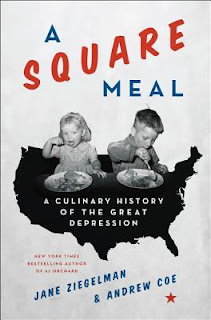 genre: non-fiction, history
genre: non-fiction, historyWhen I think of the Depression, I often envision so-called "bread lines" and the hard times of The Grapes of Wrath, but the idea of this book intrigued me - how did this period of extreme want affect the food and eating culture of my country?
Turns out, it affected it a lot. This book is really two major things: the progression and preparation of the food itself, what it consisted of, how people made do with very limited ingredient choices, how was food preserved and sold? But is also very political - how did the government handle so many of its citizens being hungry? And in some cases, not just hungry but actually starving? Is it the government's job to solve this problem? And if so, how? Do you give the employable jobs and pay them wages so they can work and earn their own money? Do you hand out food to those who WANT to work but can't get a job or does every person have an actual RIGHT to food? It's easy to think about the scarcity of food when you're removed from it. When you're watching your children actually starve - all of a sudden it is the ONLY thing.
These are seriously tricky questions and the two presidents, Hoover and Roosevelt, handled it differently at different times.
This was as fascinating as I'd hoped it would be. I didn't particularly love the writing and sometimes it it felt frustratingly non-chronological in terms of the political stuff, or maybe it was just that there were so very many acronyms and the political stuff wasn't why I was reading, but the rest of it was so intriguing. The dishes and recipes (some of them are SO nasty), the interacting of women with the world around them with new appliances and gadgets and ways of preparing foods. The advertising to women, the propaganda, the anecdotes of real families trying to survive. The way that world events impacted American families and food habits. I loved learning about the school lunch programs and the CCC and tried to imagine my own Great-Grandma, raising her twins during this time period - HOW did she do it??
I think you'd have to be pretty interested in the subject to not mind all the political stuff but for someone who IS interested, I was always interested in listening.



























No comments:
Post a Comment